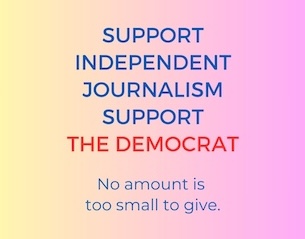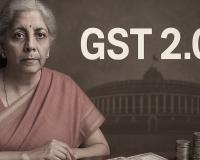- Editorial
- The Electoral Bond Scam: The Biggest Scam Since Independence
The Electoral Bond Scam: The Biggest Scam Since Independence

Neeraj Jain
On 15 February 2024, six years after the electoral bonds (EBs) scheme was rammed through the Parliament by the Modi Government, the Supreme Court declared the scheme unconstitutional and scrapped it. It also forced the government to reveal the full details of the scheme — who purchased the bonds and donated them to which party.
In an interview given to the ANI in the middle of the 2024 Lok Sabha elections, two months after the Supreme Court struck down the scheme as unconstitutional, PM Modi defended the scheme. He claimed that the scheme was meant to curb black money in elections, and bring in transparency. The policy enabled the public to have access to the money trail — which company donated, to whom they donated, and how they donated. And so he declared, that when there is an honest reflection, everyone will regret the scrapping of the scheme.[1]
Two weeks ago, he made a similar claim on Thanti TV, that “where funds have come from, how they are being used” is only known because of the BJP’s electoral bonds scheme.[2]
These are amazing assertions. The PM is barefacedly lying! The scheme had been challenged in the Supreme Court precisely on the grounds that it made electoral funding of political parties more opaque, and also that it legitimised high-level corruption at an unprecedented scale by removing funding limits for corporate donors and by opening a backdoor for the funding of Indian elections by foreign interests and lobbyists. In its judgement delivered on 15 February 2024, the Supreme Court struck down the Electoral Bond Scheme 2018 holding that it is violative of the right to information under Article 19(1)(a) of the Constitution. The Court declared that the scheme was unconstitutional because it violated the right of the people to be informed about who is donating how much to political parties; that it could lead to quid pro quo arrangements between corporates and governments headed by these political parties; and that it distorts the level playing field by giving a massive advantage to parties in power.[3] The details of the donors and to which political parties they gave donations became known only after the Supreme Court forced the State Bank of India (SBI) to reveal the details. The SBI was initially very reluctant to part with the information. It pleaded in the Supreme Court that it needed more than three months to compile and publish the data. But when the Supreme Court insisted, and warned the State Bank of contempt action if it did not comply with the Court’s orders, it made the information public in 24 hours.[4] It submitted the details to the Election Commission of India (ECI) which it uploaded on its website.
To fully understand the Supreme Court judgement and how Modi is blithely lying to defend the biggest corruption scam not just in India but in the world — to quote renowned economist Parakala Prabhakar, the husband of Union Finance Minister Nirmala Sitharaman, in an interview given to the news channel Reporter TVe[5] — we need to go into the history of electoral bonds.
The Modi Government came to power in 2014, vowing to make India corruption free. Its election manifesto of 2014 said that “lack of openness in government and lack of people’s participation”. had resulted in “concentration of power in a few hands, and lack of transparency, breeding corruption and nepotism on a massive scale”.
Electoral Bond Scheme: Important Attributes
In 2017, the Modi Government introduced the EBs scheme in Parliament. For this, it made several amendments in existing laws, which were done through two consecutive Finance Acts 2016 and 2017. Defending the scheme, the then Finance Minister Arun Jaitley claimed that it "envisages total
clean money and substantial transparency coming into the system of political funding." He argued that the scheme will ensure only white money flows to political parties, as the donors will have to donate through proper banking channels.[6] Let us examine the most important features of the bonds, in the context of these claims:
-
Electoral bonds will ensure anonymity — their names will not be revealed. The transactions between the political parties and donors will remain completely hidden from the general public.
-
You can donate even if you are not making any profits. Till 2017, the law was that donors must be profit-making entities for three years before giving the donation, and they could donate at the most 7.5% of their average profit of the past 3 years to political parties. The Modi government removed this restriction.
-
The government amended the FCRA to make it possible for foreign companies with subsidiaries in India to donate to political parties.
Duplicitous Claims
Several questions arise.
Firstly, how do EBs bring in transparency in political funding? People will not know which company donated how much to which party; and how much political donations were received by the various political parties. So instead of transparency, EBs actually made political funding opaque.
Secondly, while the government claimed that political parties (including the party in power at the Centre, the BJP) would not know the identities of the donors, it later became clear that political parties would know the identities of the donors who had donated to them. But they would not know how much money was going to other parties. It was also revealed that the bonds were not so anonymous after all. Each EB had a unique alphanumeric number, and the State Bank of India (SBI), the issuer of the electoral bonds, knew the identities of the purchasers of the bonds and to whom they were donated. Things became even murkier when the government issued a notification that while information about the buyer would be treated as confidential by the SBI, and would not be revealed to any authority for any purposes, it would have to reveal the information when demanded by a competent court or when it was required by the law enforcement agencies. This only meant that if the CBI / ED wanted, they could access the details about which company had purchased how much EBs, and donated them to which party. This totally demolishes all claims about transparency, and level playing field. It means that while the opposition parties will not know how much money the BJP is receiving, and from which company, since the BJP controlled the SBI as well as the ED / CBI, it will know everything — which political party was getting how much donation, and from which company.[7]
Thirdly, the earlier restriction on the amount of money companies could donate limited the quid pro quo element to some extent and protected shareholders interest too. The removal of this restriction, that limited the donations to 7.5% of their net profits, meant that now there were no funding limits for corporate donors. Not only that, the anonymity of the EBs made it possible for loss making businesses and even businesses that did not exist to donate infinite amounts to political parties! The scheme thus opened the avenues for donations to come into the BJP party coffers through all kinds of dubious means, for quid pro quo on part of the Modi Government. Worse, by removing the ban on foreign funding, it opened the doors for foreign corporates to influence Indian politics. In fact, in an affidavit filed in the Supreme Court on 25 March 2019, the Election Commission of India too had made these very arguments! Its affidavit stated that electoral bonds, contrary to government claims, wreck transparency in political funding:
“It is evident from the Amendment which has been made, that any donation received by a political party through electoral bond has been taken out of the ambit of reporting...this is a retrograde step as far as transparency of donations is concerned ...”
Ripping apart the amendments made to various key statutes through the Finance Acts of 2016 and 2017, the ECI stated that these amendments would enable flow of black money to political parties through shell companies and allow
“unchecked foreign funding of political parties in India which could lead to Indian politics being influenced by foreign companies.”[8]
Even the Reserve Bank of India had opposed the move to bring EBs, saying this will not only override the RBI's sole authority for issuing bearer bonds, it will also not achieve the intended purpose of transparency and be in violation of the principles and the spirit of the Prevention of Money Laundering Act (PMLA) 2002.[9]
Finally, if everything was so good about the electoral bonds scheme as was being claimed by the Modi Government, what was the need of introducing the scheme in Parliament as a part of Finance Act 2017, and thus getting it passed as a money bill to escape scrutiny in the Rajya Sabha. A scheme to bring in transparency was itself being passed in a non-transparent manner!
The Supreme Court Judgement
These were precisely the most important grounds on which the Supreme Court struck down the EBs scheme. A five-judge Constitution Bench of the court deemed the scheme “unconstitutional” on the grounds that it violated the right of the people to be informed about who is donating how much to political parties; that it could lead to quid pro quo arrangements between corporates and governments headed by these political parties; and that it distorts the level playing field by giving a massive advantage to parties in power. The court also struck down several amendments that the government made in key laws to facilitate anonymous corporate donations to political parties.
The court ruled that the scheme by permitting anonymous political donations to political parties infringed upon the right to information which is a fundamental right under Article 19(1)(a) of the Constitution. It pointed out that right to information is the key to strengthening participatory democracy. All information that promotes democratic participation must be available to citizens. This is why personal details of electoral candidates are furnished to voters. Though the disclosure of such information may violate the right to privacy of candidates and their families, it is essential that it be disclosed because it furthers public interest. The requirement to disclose information about electoral candidates is extendable to political parties. Information about the funding of political parties is essential for exercising informed choice at the ballot box, the judgement said.
The court also ruled that the amendment permitting unlimited political contributions by companies allowed the inflow of “huge contributions” by companies and multinational corporations with major business stakes in the country. The judgment highlighted the deep nexus between money and politics, saying that contributions made by companies are purely business transactions made with the intent of securing benefits in return. In paragraph 201 the court bluntly said: “the reason for political contributions by companies is as open as day light. Even the learned Solicitor General did not deny during the course of the hearings that corporate donations are made to receive favours through quid pro quo arrangements.” These arrangements could result in favourable policy changes and government licenses which the voters have a right to know about. This information is concealed under the EBs scheme.
The judgement also noted that the EBs scheme by allowing inflow of huge amounts of corporate donations would affect our democracy, as the elected would be more responsive to the companies than the ordinary citizens. The Chief Justice Chandrachud observed: “This is violative of the principle of free and fair elections and political equality captured in a value of ‘one person, one vote’.” [10]
ECI Data: Income of Political Parties from Electoral Bonds
Subsequent to the court’s directions, the SBI supplied the entire EBs data to the Election Commission that it uploaded on its website. The data reveals how much each party received from EBs since the inception of the scheme in March 2018 till the Supreme Court declared it unconstitutional in February 2024. Speaking at the India Today Conclave on 15 March 2024, Home Minister Amit Shah claimed:
“There is a perception that the BJP benefitted from the electoral bonds scheme because it is in power... The BJP received around Rs 6,000 crore through electoral bonds. The total bonds (of all parties) amounted to Rs 20,000 crore.”[11]
Amit Shah was blithely lying. The SBI / ECI data shows that lion’s share of the EBs went to parties in power, with nearly 50% of the donations going to the BJP. The BJP received Rs 8,251.8 crore of the total of around Rs 16,492 crore contributions received by political parties through EBs — just over half the value. The party coming in second was the Congress, but it was way behind, with Rs 1,952 crore worth of bonds redeemed. The BJP received more money than the next 30 political parties combined. Chart 1 gives the total contributions received by the top 7 parties. {Note that while the total bonds sold were of Rs 16,518.11 crore, total bonds encashed by political parties totalled Rs 16,492.47 crore. The EBs not redeemed (Rs 26 crore) were transferred to the Prime Minister National Relief Fund.}[12]
Chart 1: Contributions Received by Top 7 Parties
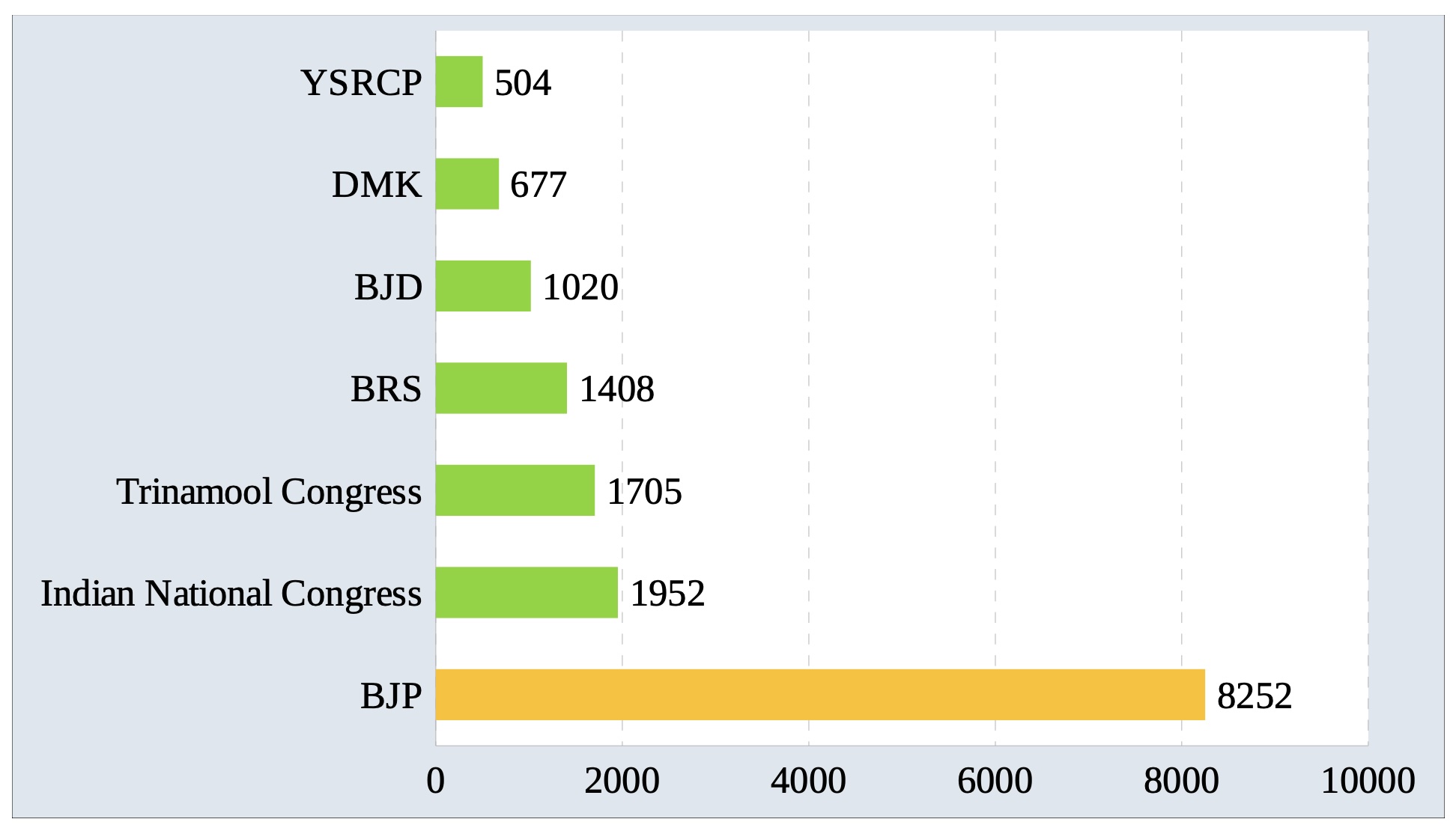
Of the total donations of Rs 16,492 crore received by political parties over the period 2018 to 2024 through electoral bonds, around 94% of the bonds had a face value of Rs 1 crore. This indicates that corporates and high net-worth individuals must have been the principal donors.[13]
Funding for Political Parties from Other Sources
Electoral bonds is only one route for political parties to receive funding. They also accept large donations from electoral trusts made up of major corporations, and smaller amounts from individuals / party units / unions / party levies / and others. All donations of above Rs 20,000 received by these other means have to be declared by political parties to the ECI. The ECI data shows that during the period 2014–15 to 2022–23 (we don’t have ECI data for 2023–24 as yet):
-
Total donations received from corporates, individual donors and other sources by all political parties (above Rs 20,000, excluding electoral bonds) = Rs 9,225 crore.[14]
-
Of this, total donations received by BJP = Rs 4,824 crore (52.3%).
Including electoral bond donations, this means that total donations received by political parties over the period 2014–15 to 2023–24 (this data does not include non-EB donations to political parties for the year 2023–24 as that data is not yet available) is:
-
Total donations received by the BJP = 8252 + 4824 = Rs 13,076 crore.
-
Total donations received by 31 national and regional political parties through electoral bonds
and other forms of donations declared to ECI = 16492 + 9225 = Rs 25,717 crore [15]
-
Share of BJP in total donations received by all political parties = 13076 / 25717 = 50.8.%
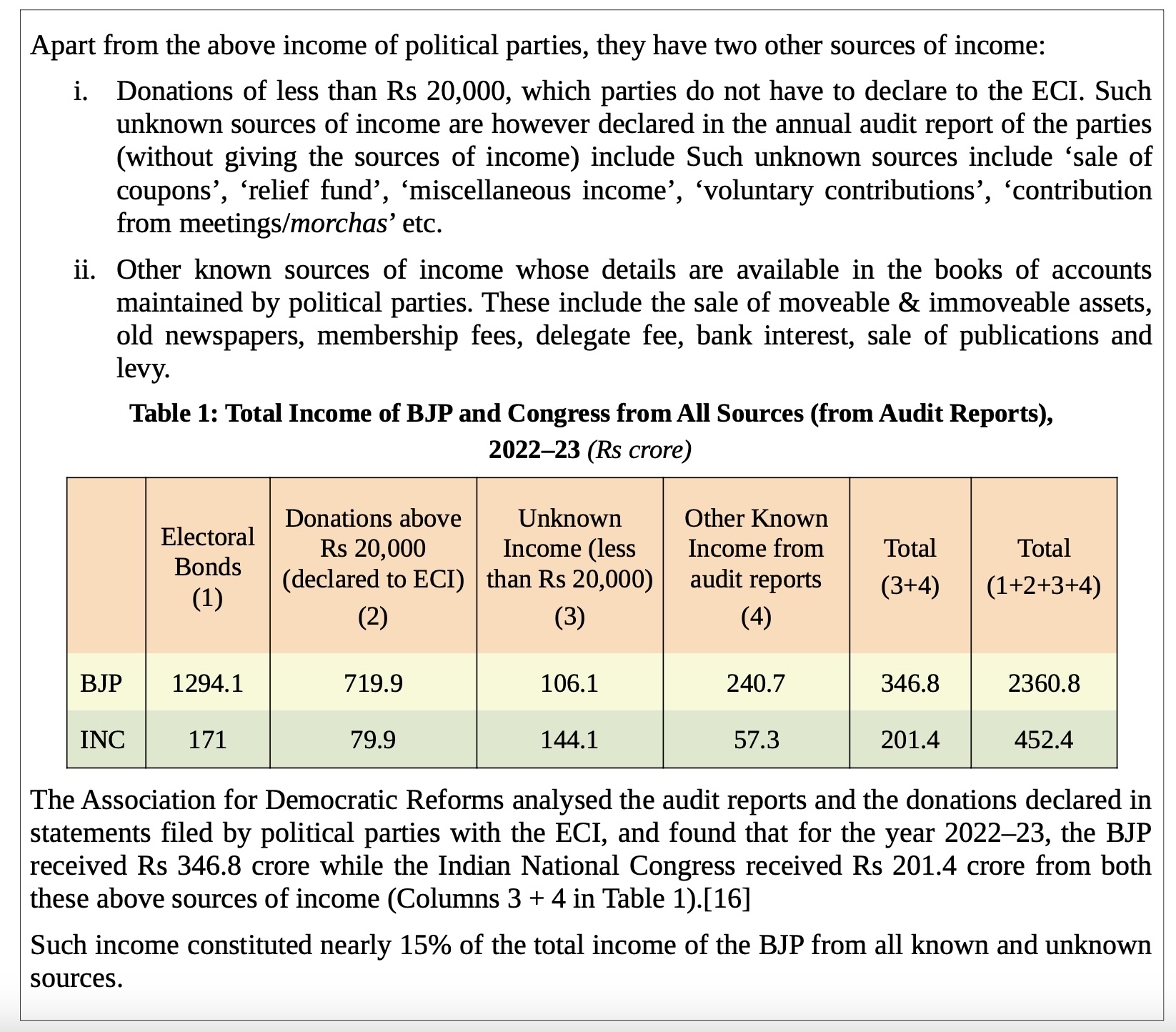
Analysis of ECI Data: EBs and Quid Pro Quo
Let us return to the ECI data on electoral bonds, and see what the data reveals.
An interesting fact is revealed when we compare donations received by the BJP from electoral bonds and donations received through other means (that have to be declared to the ECI). Once the BJP launched the EB Scheme, not only did the total donations to political parties hugely increase, most of the donations were through this scheme (see Chart 2). The reason is obvious — the anonymity of EBs, and the possibility of quid pro quo arrangements that become easy because of this anonymity.[17]
Chart 2: Electoral Bonds vs Other Donations Declared to ECI (Rs crore)
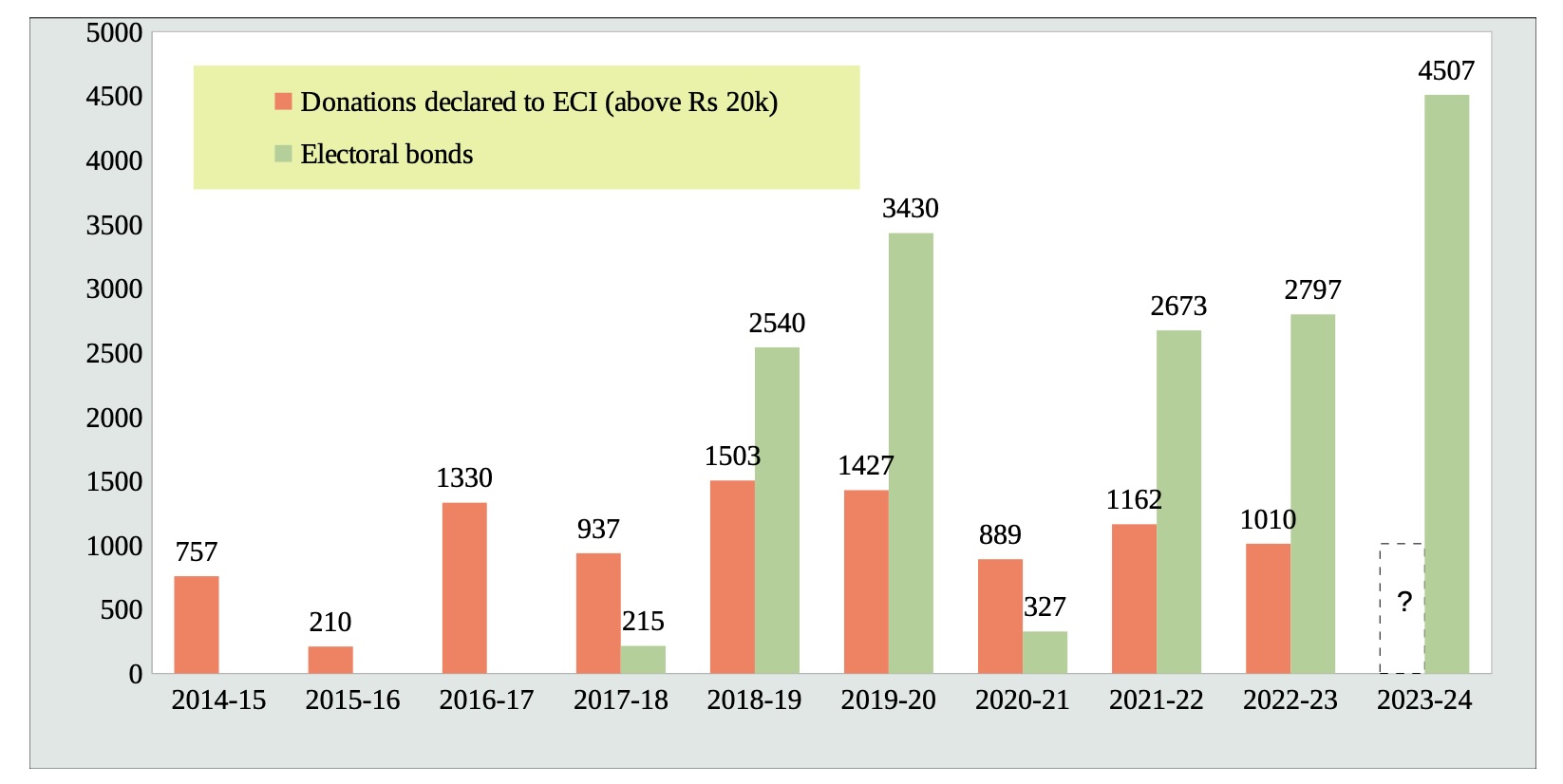
The data uploaded by the ECI enables us to match corporate donors with the political parties — as to how much party received from which corporate house. It reveals that much of the donations were indeed given as quid pro quo arrangements — as the Supreme Court had suspected.
In return for a few hundred crores of EB donations, the BJP brazenly allowed companies to get away with money laundering, allowed companies to cut corners in executing projects that even led to accidents, changed environment laws and procedures to allow companies to get away with environmental pollution, amended the Mines and Minerals (Development & Regulation) Act to allow private mining companies to make windfall profits, amended the Electricity Act and Telecom Act to benefit private corporations, twisted procedures and ignored protective laws for tribals making it easier to hand over precious mineral blocks cheaply to private miners, allowed drug companies to get away with making sub-standard drugs, etc.
Immediately after the ECI uploaded the final tranche of EB data on its website, the Association for Democratic Rights (ADR), one of the petitioners in the electoral bonds case in the Supreme Court, analysed the data and stated that it points to corporates purchasing bonds in return of kickbacks. Addressing a press conference, Advocate Prashant Bhushan, who appeared in the court said that the data revealed four types of corruption: i) Chanda Do, Dhanda Lo (i.e. Prepaid Bribe); ii) Theka Lo, Rishvat Do (i.e. Postpaid Bribe); iii) Hafta Vasooli (i.e. Extortion) iv) Farzi Company (i.e. Shell Companies). The Indian National Congress too analysed the data and came to a similar conclusion. [18]
-
Chanda Do, Dhanda Lo; and Theka Lo, Rishvat Do (i.e. Pre- and Post-paid Bribe)
-
Hafta Vasooli (i.e. Extortion)
-
Ghoos do, Ghatiya Davai Banao (Give bribe, make sub-standard drugs)
-
Farzi Companiyan (i.e. Shell Companies)
1. Chanda Do, Dhanda Lo and Theka Lo, Rishvat Do (Pre- and Post-paid Bribe):
As per figures provided by Prashant Bhushan and ADR, 33 groups of companies got 172 major contracts and project approvals from the Government, of a total value of Rs 3.7 lakh crore, in exchange for Rs 1,751 crore electoral bond donations to the BJP. While as per data analysis done by the Congress, 38 corporate groups got 179 major contracts and projects approvals from the Central or BJP state governments worth a total of Rs 3.8 lakh crore. In exchange for these projects & contracts, these groups have given Rs. 2,004 crores in electoral bonds donations to the BJP.[19]
Here are a few examples of such quid pro quo arrangements:
i) Megha Engineering and Infrastructures Limited (MEIL):
Telengana based MEIL is the second biggest donor to political parties through electoral bonds. MIEL and its associated companies donated Rs 1,232 crore. The BJP was the biggest beneficiary — it received Rs 669 crore (54%); Bharat Rashtra Samithi (BRS), the erstwhile ruling party of Telengana, got Rs 195 crore, while its Andhra Pradesh counterpart YSR Congress got Rs 37 crore. MEIL has also donated smaller amounts to several other political parties.
Megha Engineering started just three decades ago in 1989 with less than ten people. Within 3 decades, it has grown to become an infrastructure giant, and its directors P.P. Reddy and P.V. Krishna Reddy today have assets worth $6 billion each. [20] In the last few years, the company has seen a meteoric rise, winning major infrastructure projects across country.
In October 2019, the income tax department raided the company’s offices in 15 cities across India. Soon after, the company began purchasing electoral bonds.[21] ECI data shows that MEIL is the most frequent purchaser of electoral bonds in the country.[22] An Indian Express investigation found that several large infrastructure projects won by MEIL were awarded to it either just before or immediately after the company purchased electoral bonds, and a sizable chunk of these bonds were redeemed by the BJP. To give just one example from the report: just a month before it bagged the prestigious Rs 14,400-crore Thane–Borivali twin tunnel project in May 2023 from the Mumbai Metropolitan Region Development Authority, MEIL bought electoral bonds worth Rs 140 crore. Of these, Rs 115 crore worth were redeemed by the BJP. [23]
The Kaleshwaram Lift Irrigation project in Telangana, the world’s biggest such project, is also being constructed by the company. BRS awarded the construction contract to MEIL. A CAG report has found the project to be riddled with irregularities and corruption, which have given huge benefits to MEIL; consequently, the project’s original outlay of Rs 80,000 crore has now crossed Rs. 1.5 lakh crore, and there is no knowing when the project will be completed. No wonder that BRS is the second biggest beneficiary of the company’s electoral bond donations after the BJP. [24]
i) Vedanta and Other Mining Giants
Mining giant Vedanta Limited is the fourth largest buyer of electoral bonds, totalling Rs 402.4 crore. More than half went to the BJP (Rs 230.15 crore).
The reason is not far to seek. Vedanta’s projects are notorious for environmental pollution, because of which its projects face stiff opposition from the local population, from Tamil Nadu to Odisha to Rajasthan. Despite these protests, Vedanta continues to get environmental clearance for expansion of its existing projects, and setting up new ones.
To give just one example: Vedanta bought is first set of bonds worth Rs. 39.65 crore on 16 April 2019, all of which were donated to the BJP. Days later, on 25 April 2019, Vedanta received environmental clearance from the Environment Ministry for the expansion of its oil and gas operations in Rajasthan. On 27 October 2022, the company received an extension of its license to explore and produce oil and gas in Rajasthan till 2030. Within 18 days, it purchased electoral bonds worth Rs 110 crore, of which Rs 100 crore went to the BJP.[25]
For similar reasons, Utkal Alumina has purchased electoral bonds worth Rs 145 crore — its projects in Odisha have been facing huge protests from local people. And Jindal Group has purchased EBs of Rs 195.5 crore — its mining projects too have caused enormous environmental destruction. [26]
iii) Bharti Airtel and Telecom Dhanda
Despite a Supreme Court order of 2012 calling for the compulsory auction of spectrum, on 18 December 2023, the Modi Government introduced a new telecom law in Parliament that allowed administrative allocation of spectrum for “certain satellite-based services”, thus doing away with the need for competitive auctions. With 143 Opposition MPs suspended from both houses, the government had no problems in getting the bill passed by Parliament.
In the run-up to the new law, only one company OneWeb India was granted the necessary approvals by the government for applying for spectrum for satellite-based broadband services. Being the only company so far to get these approvals from the government gives OneWeb India a first-mover advantage in the satellite broadband industry.
OneWeb India is a subsidiary of telecom service provider Airtel’s parent company Bharti Enterprises, a multinational conglomerate headquartered in Delhi.
Interestingly, ECI data on electoral bonds shows that the Bharti group donated Rs 150 crore to the BJP through two sets of bonds purchased before and after the government introduced the telecom bill in Parliament. The first set of bonds worth Rs 100 crore was purchased by Bharti Airtel and donated to the BJP on November 9. Eight days later, on November 21, OneWeb got authorisation from the space regulator to apply for satellite spectrum from the government.
After the telecom bill was signed into law by the President on Christmas eve, Bharti Airtel Limited bought another Rs 50 crore worth of electoral bonds, which the BJP encashed on January 12.
In all, between 2019 and 2024, Bharti Airtel Limited and its other group companies have purchased a total of Rs 247 crore worth of electoral bonds, of which Rs 236.4 crore have been donated to the BJP. [27]
iv) Aditya Birla Group and Vi Bailout
Vodafone Idea, or Vi, which is jointly owned by the British firm Vodafone Plc and the Indian conglomerate Aditya Birla group, has been in troubled waters for more than five years. The main reason for Vi’s troubles is debt. The telecom operator owes Rs 2.14 lakh crore to banks, financial institutions, and most of all to the Indian government.
In September 2021, the Modi government announced a relief package that allowed struggling players in the telecom sector to convert a part of their government debt into equity held by the government. In January 2022, Vi opted for this conversion. But till the end of the year, the government made no move to convert the company’s debt into equity. Meanwhile, Vi made desperate attempts to raise funds to pay its vendors, but to no avail.
On 12 December 2022, three Aditya Birla group firms donated Rs 100 crore to the BJP in electoral bonds. In February 2023, within two months of the donation, the Modi government approved the conversion of Vi’s government debt of Rs 16,000 crore into equity, making the Indian government the largest shareholder in Vi.
On November 20, 2023, the Aditya Birla group donated another Rs 100 crore to the BJP, a month before Parliament passed a new Telecommunications Bill. The new law met two longstanding demands of the telecom industry. One, it allows spectrum to be used for a different technology than for which it was obtained. And two, it empowered the government to provide telecom operators access to private property “in public interest” to establish, operate and maintain telecom infrastructure.
At nearly Rs 556 crore, the Aditya Birla group is one of the top electoral bond donors to political parties. Of this, Rs 285 crore went to the BJP. The group also donated Rs 264.5 crore to the Biju Janata Dal, which is in power in Odisha, where the group has mining, metal, and chemical interests. [28]
v) Navyuga Group and Silkyara Tunnel Collapse
In June 2018, Navayuga Engineering signed a Rs 854-crore contract with the Centre to build the 4.5 km long Silkyara Bend–Barkot tunnel in Uttarakhand.
Over the period 2019–22, the company purchased Rs 55 crore of electoral bonds, all of which went to the BJP.
In November 2023, the Silkyara tunnel collapsed, trapping 41 workers. It was only after a very challenging rescue effort that lasted 17 days that the workers were finally rescued alive.
The tunnel was supposed to have an escape route for such an eventuality. According to the Standard Operating Procedure, all tunnels over 3 km long are supposed to have an escape route to rescue people in case there is a calamity. The Cabinet Committee on Economic Affairs chaired by PM Modi while giving its approval for the project had also explicitly mentioned that the tunnel should have an escape passage. It has now come to light that while the Silkyara tunnel project plan did mention the construction of an escape passage, the company changed the plan and it was not built
— due to cost and time concerns. Geologists have also pointed out several other lapses in the construction of the tunnel. Despite these serious lapses, which nearly led to the death of 41 workers, news reports say the BJP government seems to be unwilling to file an FIR against the company for this criminal lapse; nor does it have any plans to terminate the contract with Navayuga and start afresh with a new contractor. Is all this because of the bribe of Rs 55 crore? [29]
Hafta Vasooli (Extortion)
An analysis of ECI data reveals that at least 37 corporate groups bought electoral bonds after they were faced with action by central government agencies such as the Enforcement Directorate, the Income Tax Department, the Central Bureau of Investigation and state agencies. Overall, they purchased EBs worth Rs 5927.9 crore, which is 36% of the total amount.[30] Table 2 gives a list of the top 11 donors from this list, and the dates of the raids on them.
Table 2: Electoral Bonds Purchased by Companies and Details of Investigation Against Them by Investigative Agencies
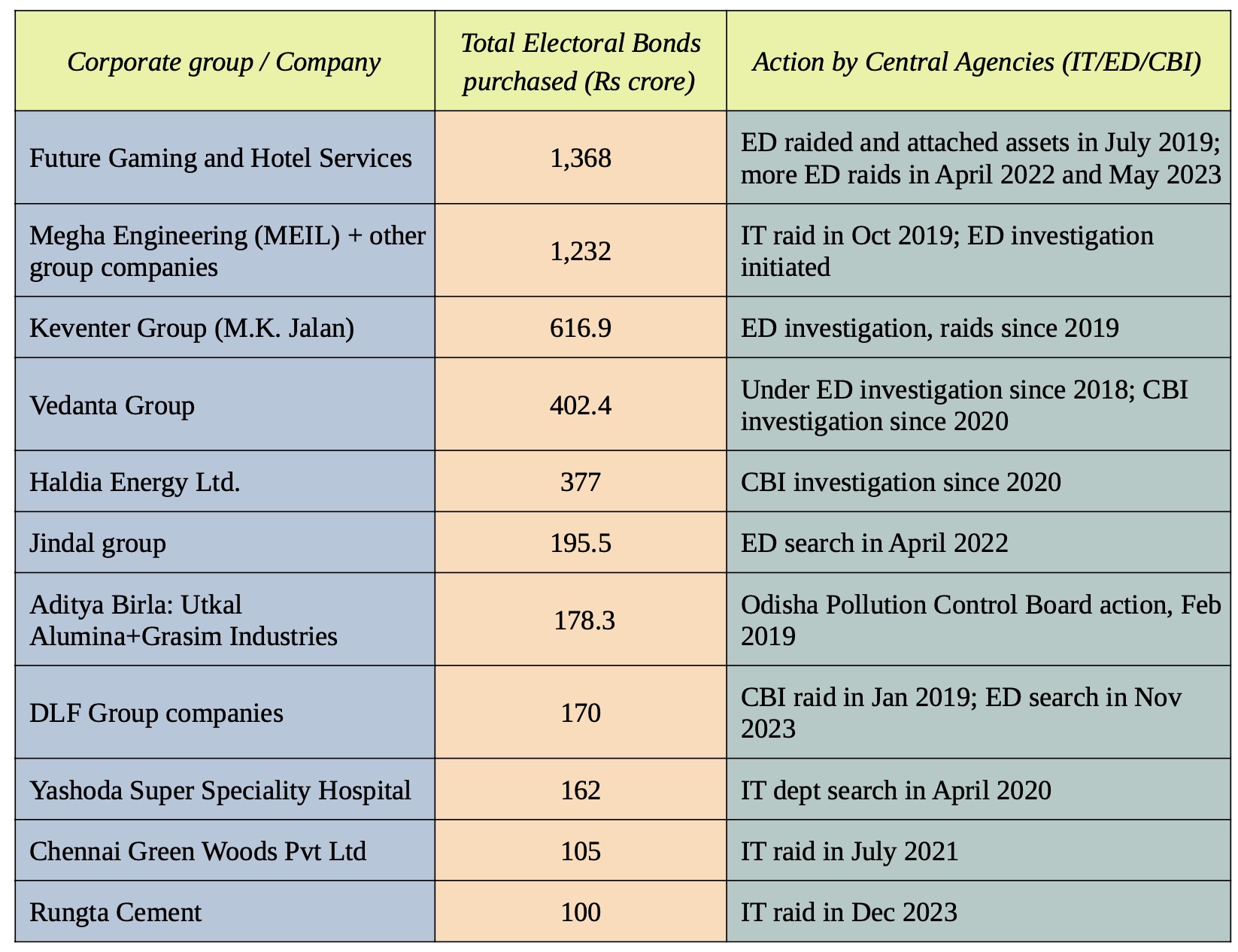
3. Ghoos do, Ghatiya Davai Banao (Legalising sub-standard drugs)
This is not just horrifying, it is actually murderous!
ECI data reveals that 35 pharmaceutical companies in India have contributed Rs 945 crore to political parties through electoral bonds. At least 22 of the 35 companies donated money to the ruling parties in states where they produce their medicines.
At least 11 political parties took money from pharma companies. The BJP is the largest beneficiary of pharma donations; it received Rs 394 crore. Another big beneficiary is the BRS. Till recently, it was in power in Telengana, a hub of drug making companies. It received Rs 328.5 crore in bonds from 14 pharma companies. Another regional party in power, the Sikkim Krantikari Morcha, pocketed Rs 25.5 crore in donations from four drug firms — nearly 70% of the total bond money it received. Most of these firms have manufacturing units in the foothills of southern Sikkim.
Why should drug making companies be giving donations to political parties? They could be giving bribes for cheap land, tax exemptions, and favourable policies; they could also be seeking relaxation in price caps. But the most scary reason found in an investigation by Project Electoral Bond, a collaborative effort of 3 news organisations and several independent journalists, was that at least seven companies that purchased the bonds were being investigated for poor quality drugs — and after purchase of EBs, they were allowed to go scot free, no action was taken against them. Here is a brief summary of this sordid saga:
Hetero Labs and Hetero Healthcare bought EBs for Rs 140 crore. The reason — it was slapped with notices for substandard drugs at least six times between 2020 and 2022. These included remdesivir, an antiviral drug widely used to treat Covid-19; Itbor capsule, an antifungal medicine; and Monocef, used for bacterial infection. The Telengana drug regulator took no action against the company. Instead, BRS sent the chairman of this health sector conglomerate, Dr B. Pardhasaradhi, to the Rajya Sabha in May 2022. He is the richest MP in Rajya Sabha. The BRS received the bulk of Hetero’s donations, Rs 120 crore.
Gujarat-based Torrent Pharma bought EBs worth Rs 77.5 crore between 2019 and 2024 — of these, Rs 61 crore was donated to the BJP, and Rs 7 crore to the Sikkim Krantikari Morcha. The company has been issued warnings by the United States Food and Drug Administration (FDA) in 2019 and then again in 2022 for quality violations. Between 2018 and 2023, it also received four notices for substandard drugs from Maharashtra and Gujarat FDAs for substandard drugs. Yet the drug regulators of Gujarat and Sikkim, where its manufacturing units are located, have not taken any action against the company. Among its drugs found substandard were: antiplatelet medicine Deplatt-150; Losar H, used to lower blood pressure; Nicoran LV, used to treat heart diseases; and Lopamide medicine, used to treat diarrhoea.
Gujarat-based Zydus Healthcare purchased EBs worth Rs 29 crore. The bonds were purchased after the Bihar drug regulator declared a batch of remdesivir medicines manufactured by the company substandard in 2021. But the Gujarat drug regulator simply sat over the issue.
Glenmark received five notices for substandard drugs between 2022 and 2023 — one of its drugs found substandard was its blood pressure regulating medicine Telma. The pharmaceutical company purchased Rs 9.75 crore of EBs in November 2022.
Cipla received four show-cause notices for its drugs between 2018 and 2022 — these include its RC cough syrup, and its remdesivir medicine, Cipremi. Since 2019, it has purchased EBs worth Rs 39.2 crore.
IPCA Laboratories Limited bought EBs worth Rs 13.5 crore between November 2022 and October 2023. Its anti-parasitic medicine, Lariago — was flagged as substandard.
Intas Pharmaceutical bought 20 crore worth of EBs in October 2022. Its Enapril-5 tablet found substandard.[31]
4. Farzi Companiyan (Shell Companies)
A press release by the Ministry of Corporate affairs on shell companies says:
“There is no definition of the term ‘Shell Company’ in the Companies Act and it normally refers to a company without active business operation or significant assets, which in some cases are used for illegal purpose such as tax evasion, money laundering, obscuring ownership, benami properties etc. This was stated by Union Minister of State for Corporate Affairs Shri Rao Inderjit Singh in a written reply to a question in Rajya Sabha today.”[32]
Perusal of the data disclosed on electoral bonds shows that there are several companies which have been in existence for just a few months and yet have purchased electoral bonds worth crores of rupees; there are companies that have declared zero profits for the past several years, and yet have found the money to donate hundreds of crores of rupees through electoral bonds to political parties; and there are also companies that have donated several times their average profits of the last few years. Clearly, many of these would fit into the above definition of shell companies.
i) Donations in Violation of Companies Act
ECI data shows that at least 20 companies bought electoral bonds worth a total of Rs 103 crore within three years of their incorporation. In some cases, the companies were just a few months old when they purchased bonds! For instance, Tsharks Infra Developers Private Limited, Tsharks Overseas Education Consultancy Private Limited, Bain Global Resources LLP and Vasavi Avenues LLP, all incorporated in 2023, bought electoral bonds totalling Rs 17.5 crore within just 3 months of their incorporation. [33]
Of these donations, Rs 31.5 crore went to the BRS, and Rs 26 crore to the BJP. Seven other parties received smaller amounts.
These donations are clearly in blatant violation of the regulatory framework governing contributions by companies to political parties. Section 182(1) of the Companies Act prohibits any company having been in existence for less than 3 years from making contributions to political parties — even through the electoral bonds route. This rule was made to ensure that shell companies are not set up just for the sake of donating to political parties and thereby becoming a way to launder money.
ii) Loss-Making Firms Give Donations
Apart from the above companies, which are clearly shell companies, an investigation by The Hindu found that here are at least 33 loss-making companies which purchased and donated electoral bonds worth Rs 576.2 crore {out of which Rs 434.2 crore (nearly 75%) was donated to the BJP}. These companies had reported aggregate net losses of over Rs 1 lakh crore in the seven years from 2016– 17 to 2022–23. How did such huge loss making companies come to buy electoral bonds of hundreds of crores of rupees?
Most of these companies are clearly shell companies, with only one purpose — to launder funds for hidden entities. [34]
iii) Companies Donate Several Times Their Net Profits
Before the amendments brought in the electoral bonds scheme, a company could donate up to 7.5% of the average profits it earned over three previous financial years. This was done to ensure that only legitimate companies, doing some business, get to donate, and there was a cap on how much they could donate.
The BJP government changed the Companies Act in the 2017 Union budget to remove this cap. An analysis of the list of electoral bond donors alongside the corporate filings of some of the largest donors reveals that this amendment led to a flood of donations to political parties via electoral bonds, most of which flowed to the BJP. At least 31 firms donated much beyond their three-year average profits. These include:
- Lottery king Santiago Martin’s Future Gaming and Hotel Services Private Limited, the biggest electoral bonds donor, donated over 16 times its average three-year profits. It donated Rs 1,368 crore in total, of which over Rs 540 crore went to TMC, Rs 509 crore went to DMK, Rs 159 crore to YSR Congress and Rs 100 crore to BJP.
- Reliance-linked Qwik Supply Chain, the third largest donor, donated Rs 410 crore — 15 times its profit. Of this, Rs 375 crore, or 90% went to the BJP.
- Mahendra K Jalan’s Madanlal Ltd donated over 56 times its average three-year profit. Of its donation of Rs 185.5 crore, Rs 175.5 crore went to BJP.
- Kolkata-based liquor distribution firm Castle Liquors Private Limited barely earned an average profit of Rs 6 lakh in the last three years but donated Rs 7.5 crore — 118 times more — to political parties. About 90% or Rs 6.8 crore went to BJP.[35]
iv) EBs Whitewash Money Laundering
Among the bond donors are at least 18 companies that figure in the list of “high risk” companies notified by the finance ministry in 2018 for violating rules under the Prevention of Money Laundering Act (PMLA). After donating to the party in power, the names of these companies abruptly disappeared from the list, suggesting that it was the bond money that did the trick. [36]
5. Full Details of Bribes Given Yet to be Disclosed
All the facts given above — about the quid pro quo arrangements between corporations and parties in power, especially the BJP — are based on information for bonds totalling Rs 12,500 crore. The total electoral bonds sold were worth around Rs 16,500 crore. So, there is no information on electoral bonds worth Rs 4,000 crore — as to who were the corporate donors of these bonds — which means the total list of bribes is much more than the sordid data given above.[37.]
To Conclude
A decade ago, in the run-up to the 2014 Lok Sabha election, Narendra Modi famously declaimed: “Na khaoonga, na khaane doonga” (Neither will I take bribes, nor will I let others take bribes). He added that he would bring back black money smuggled abroad by rich Indians and deposit Rs 15 lakh into the bank account of every citizen. Modi projected himself as a crusader against corruption and it enabled him to win the elections by a landslide.
Since then, his government has been embroiled in innumerable scams, from demonetisation to the PM Cares scam to whitewashing the corruption cases against opposition politicians after they join the BJP. But the electoral bonds scam puts all the previous scams in the shade.
The size of the scam is not Rs 16,500 crore — the amount of electoral bonds purchased and donated to political parties as quid pro quo for projects / contracts / cover-up of illegalities. For every Rs 100 crore donated, contracts worth more than Rs 10,000 crore were given to the company. Thus, on 19 December 2019, Lucknow-based infrastructure firm Apco Infratech Private Limited was given a Rs 2,716 crore contract to construct a 6.4 km-long Z-Morh tunnel in Ganderbal district by the Jammu and Kashmir administration; a month later, on 15 January 2020, the firm purchased 10 electoral bonds worth Rs 1 crore each and donated them to the BJP. In April 2023, Megha Engineering donated 140 crores of electoral bonds to the BJP, and the next month it was awarded a Rs 14,000 crore contract for the Thane–Borivali twin tunnel project by the BJP-controlled state government in Maharashtra.[38] The Aditya Birla group donated Rs 100 crore via electoral bonds to the BJP; and within 2 months, it got a Rs 16,000 crore relief package from the BJP.
That means the scam is of at least Rs 16 lakh crore, if not more!
Clearly, economist Parakala Prabhakar was not exaggerating when he said that the electoral bonds scam was not just the biggest corruption scam in India but in the world.
Notes
1. "Everyone Will Regret it...": PM Modi Defends Electoral Bonds Scheme; Accuses Oppn of Spreading Lies”, 15 April 2024, https://economictimes.indiatimes.com.
2. Sanjay K. Jha, “Modi's Spin on Electoral Bonds as 'Transparent' Triggers Congress Riposte”, 15 April 2024, https://m.thewire.in.
3. “Common Cause on the Electoral Bonds Judgment”, Press Release 15 February 2024, https://www.commoncause.in; “W.P.(C) No. 266/2024: Petition for SIT investigation in Electoral Bonds Scam”, https://www.commoncause.in.
4. “SC Gives SBI a Day to Furnish Electoral Bonds Data, Warns Of Contempt Proceedings on Non-Compliance”, 11 March 2024, https://news.abplive.com.
5. “'Electoral Bond Issue Not Only Biggest Scam in India But...,’ FM Nirmala Sitharaman's Economist Husband Says”, 27 March 2024, https://www.livemint.com.
6. “Electoral Bonds Meant to Promote White Money in Politics: Arun Jaitley”, 8 April 2019, http://timesofindia.indiatimes.com; “Journey of Electoral Bonds: Arun Jaitley Defended Anonymity”, 15 February 2024, www.deccanherald.com.
7. Prasenjit Bose, “Decoding Electoral Bonds Data”, 19 March 2024, https://www.thehindu.com; Supriya Sharma & Project Electoral Bond, “Electoral bonds: What We Know So Far, What We Will Know Soon – and What We May Never Know”, 18 March 2024, https://scroll.in. Also see this video which explains these issues very well: “Electoral Bonds | The Biggest Scam in History of India? | Explained by Dhruv Rathee”, https://www.youtube.com.
8. Krishnadas Rajagopal, “Electoral Bonds Hit Transparency in Political Funding, Says Election Commission”, 27 March 2019, https://www.thehindu.com; Akshat Jain, “‘Credibility, Transparency’ — Why RBI & Election Commission had Opposed Electoral Bonds Scheme in 2017”, 16 February, 2024, https://theprint.in.
9 “Modi Govt Ignored All of RBI's Warnings Against Electoral Bonds: Report”, The Wire Staff, 19 November 2019, https://thewire.in; “Amendments to People's Act, Unrestrained Corporate Funding: ECI, RBI's Past Objections to Electoral Bonds”, 16 February 2024, https://www.deccanherald.com.
10. The Supreme Court judgement has been widely reported in the media. See for example: Vineet Bhalla, “Explained: Why the Supreme Court Struck Down the Electoral Bonds Scheme”, 16 February 2024, https://scroll.in; “Why Did the Supreme Court Strike Down the Electoral Bonds Scheme? | Explained”, 15 February 2024, https://www.thehindu.com; Rahul Singh, “Why a Court- Monitored Probe on Quid Pro Quo Involving Electoral Bonds Is Needed”, 18 March 2024, https://thewire.in; Krishnadas Rajagopal, “Supreme Court Declares Electoral Bonds Scheme Unconstitutional”, 15 February 2024, https://www.thehindu.com.
11. “How Much Money Did the BJP Really Get From Electoral Bonds?” 18 March 2024, https://thewire.in.
12. Ibid.; Snigdhendu Bhattacharya, “Bonding with the Bonds”, 21 March 2024, https://www.outlookindia.com. See also: “Updated Data on Electoral Bonds – January 2024”, 15 February 2024, ADR, https://adrindia.org.
12. George Mathew, “Bonds Worth Rs 16,518 Cr Encashed, Over 90% had Rs 1 Cr Face Value”, 16 February 2024, https://indianexpress.com.
14. We have calculated this from data given in: Political Party Watch, Association for Democratic Reforms, https://adrindia.org, accessed on 4 May 2023. The data contains details of all donations received by National and Regional political parties. For 2022–23, it has data only for national political parties, and not for regional parties. We have estimated donations received by regional parties in 2022–23, using the ratio of donations received by national and regional political parties over the period 2016–17 to 2021–22, and assumed that the ratio remains the same for 2022–23.
15. We have taken the yearly data for electoral bonds from: “The BJP Received Little More Than Half of the Total Donations of Rs. 16,492 Crore Received Via Electoral Bonds”, 20 March 2024, https://factly.in.
16. “Analysis of Sources of Funding of National Parties: FY 2022–23”, Association for Democratic Reforms, 7 March 2024, https://adrindia.org.
17. Data for total donations taken from: Political Party Watch, op. cit., accessed on 4 May 2023; data for yearly donations through electoral bonds taken from: “The BJP Received Little More Than Half of the Total Donations of Rs. 16,492 Crore Received Via Electoral Bonds”, op. cit. Data for other donations above Rs 20,000 that have to be declared to ECI for FY 2023–24 is not available as yet.
18. “41 Companies Facing Probe by Central Agencies Gave Rs 2,471 Crore to BJP Through Electoral Bonds: Petitioners”, 23 March 2023, https://www.dailyexcelsior.com; “‘38 Firms That Donated Rs 2,000 Cr to BJP Got Projects Worth Rs 3.8 Lakh Cr,’ Alleges Congress”, 23 March 2024, https://theprint.in.
19. Ibid. See also: “Prashant Bhushan: Fear of ED, CBI, Bribe for Contracts… Bonds a Tripartite Conspiracy”, 23 March 2024, https://indianexpress.com.
20. Aathira Perinchery et al., “Who Were the Top Buyers of Electoral Bonds Paying?” 21 March 2024, https://thewire.in.
21. Ibid.
22. S. Umamaheshwar, “MEIL Most Frequent Buyer of Poll Bonds”, 17 March 2024, https://www.deccanchronicle.com.
23. Ravi Dutta Mishra, Sukalp Sharma, “Donor No.2 Megha Bought Electoral Bonds Even as it Got Key Govt, PSU Contracts”, 31 March 2024, https://indianexpress.com.
24. N. Vamsi Srinivas, “Bigger KLIS Aided Contractors”, 10 January 2024, https://www.deccanchronicle.com; Dhananjay Khatri, “CAG Flags Planning Errors, Potential Rs 2,600 Crore Undue Benefit in Telangana's Kaleshwaram Project”, 15 February 2024, https://www.cnbctv18.com; “CAG Flags Soaring Costs, 'Corruption' in Kaleshwaram Project”, 16 February 2014, https://www.deccanherald.com.
25. Aathira Perinchery, “Mining Giant Vedanta Bought Electoral Bonds Worth Rs 400.65 Crore”, 15 March 2024, https://thewire.in; Himanshi Dahiya, “Days After Approval to Expand Project in Rajasthan, Vedanta Gave Rs 100 Cr to BJP”, 27 March 2024, https://www.thequint.com.
26. Preetha Banerjee, “Electoral Bonds: At Least 4 Companies That Gave Over Rs 100 Cr have History of Violating Green Norms, Tribal Rights”, 15 March 2024, https://www.downtoearth.org.in.
27. Ragamalika Karthikeyan et al. & Project Electoral Bond, “Bharti Group’s Rs 150 Crore Bond Donation to BJP Coincided with Modi Government’s Telecom U-Turn”, 27 March 2024, https://scroll.in.
28. Ayush Tiwari & Project Electoral Bond, “Aditya Birla Group Donated Rs 100 Crore to BJP Two Months Before Government’s Vodafone Idea Bailout”, 5 April 2024, https://scroll.in.
29. E.A.S. Sarma, “Silkyara Tunnel Collapse in Uttarakhand – Independent Investigation Called for”, 1 April 2024, https://countercurrents.org; Kishor Rawat, “Big Lapse? Escape Route Was Planned for Uttarakhand Tunnel, But Not Built”, 18 November 2023, https://www.ndtv; “Silkyara Tunnel: Red Flags, Challenges Were Raised Before Collapse”, 10 December 2023, https://www.deccanherald.com; Rashme Sehgal, “Analysis: Crucial Questions About Navayuga and the EBs”, 27 March 2024, https://www.freepressjournal.in; “NHIDCL Hasn't Filed FIR Against Contractor Responsible for Collapsed Silkyara Tunnel: RTI Response”, 7 January 2024, https://thewire.in.
30. This list has been compiled by us from three news reports: Prasenjit Bose, “Decoding Electoral Bonds Data”, op. cit.; Parth M.N. et al. & Project Electoral Bond, “After Raids by Central Agencies, These 21 Companies Bought Electoral bonds”, 15 March 2024, https://scroll.in; Anjishnu Das, "Of 26 Companies Which Faced Agencies’ Heat, Two-Thirds Bought Electoral Bonds After a Knock on Door", 26 March 2024, https://indianexpress.com.
31. Tabassum Barnagarwala & Project Electoral Bond, “Seven Firms That Failed Drug Quality Tests Gave Money to Political Parties Through Electoral Bonds”, 18 March 2024, https://scroll.in; Tabassum Barnagarwala et al. & Project Electoral Bond, “Of Rs 945 Crore Bonds Donated by Drug Firms, Most Went to Parties Ruling States with Pharma Units”, 27 March 2024, https://scroll.in; Nandini Chandrashekar & Project Electoral Bond, “A Rajya Sabha Nomination and Bonds Worth Rs 120 Crore to BRS”, 26 March 2024, https://www.newslaundry.com.
32. “Government Identified 2,38,223 Companies as Shell Companies Between 2018–2021”, 27 July 2021, https://www.pib.gov.in.
33. Vignesh Radhakrishnan,Sambavi Parthasarathy, “At Least 20 Firms Bought Electoral Bonds Within 3 Years of Incorporation, a Punishable Offence: Data”, 10 April 2024.
34. Prasenjit Bose, “33 Loss-Making Firms Donated Electoral Bonds Worth Rs 582 Crore, 75% Went to BJP | Data”, 3 April 2024, https://www.thehindu.com.
35. “Electoral Bonds: The Art of Extracting Wealth from Loss-Making Firms”, The Reporters' Collective, 22 March 2024, https://www.reporters-collective.in.
36. Sangeeta Barooah Pisharoty, “18 of 19 Firms Marked 'High-Risk' by Finance Ministry That Bought Electoral Bonds Went Off Subsequent List”, 16 March 2024, https://thewire.in.
37. Ayush Tiwari & Project Electoral Bond, “Why has Data for Electoral Bonds Worth Rs 4,002 Crore Not Been Disclosed?” 15 March 2024, https://scroll.in.
38. Safwat Zargar & Project Electoral Bond, “UP Firm Gave Rs 10 Crore to BJP Less Than a Month After Bagging Contract for Kashmir Tunnel”, 22 March 2024, https://scroll.in. “Megha Engineering Got Rs 14,400 Cr Project in Mumbai Month After Rs 140-cr Bond Purchase”, 22 March 2024, https://www.indiatoday.in.
................................................................................................................................................................
About the author:
Neeraj Jain is a BTech in Electrical Engineering. He is an activist with a group called Lokayat in Pune, and is also the Associate Editor of Janata Weekly, a weekly print magazine and blog published from Mumbai.
Contact address:
Neeraj Jain, C-4 Mantri Estate, Salisbury Park, Pune – 411 037. Email: neerajj61@gmail.com.
About The Author

Neeraj Jain is a BTech in Electrical Engineering. He is a social-political activist with an activist group called Lokayat in Pune, and is also the Associate Editor of Janata Weekly, a weekly print magazine and blog published from Mumbai.
Contact address: Neeraj Jain, C-4 Salisbury Park, Pune – 411 037 Email: neerajj61@gmail.com.

